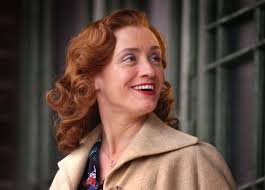
SINNERS
Ireland, 2002, 90 minutes, Colour.
Anne Marie Duff, Bronagh Gallagher, Ruth Bradley, John Kavanagh, Tina Kellegher, Ruth Mc Cabe, Alan Devlin.
Directed by Aisling Walsh.
Sinners was made for television and was released the same year as the higher profile The Magdalen Sisters written and directed by Peter Mullen. Both films have the same subject.
The setting is Dublin in the 1960s with the focus on the Magdalen homes for young women, especially unmarried pregnant women. These Magdalen homes were staffed by nuns, generally women who had been trained to be hard on their charges, supervising the laundries, supervising the dormitories and meals, reciting prayers as the girls do their laundry work. As might be expected, especially from films about this time and the criticism of clergy clerical abuse, there is a chaplain who has his eye on some of the girls, calling them to his room on the pretext of confession, and behaving reprehensibly. He is eventually moved – and a very young, inexperienced priest takes his place.
The focus is on the young woman played by Anne- Marie Duff, put into the home by her relatives, her hoping that a cousin would help her release but he betrays her. She is a thorn in the side of the authorities and punished accordingly. Bronagh Gallaher plays her good friend. She is pregnant, gives birth, has hopes of one of the guards marrying her and taking away but, when this fails, she kills herself.
Anne- Marie Duff escapes, knocks on the door of an older man who reported to the authorities yet later thinks twice about his experience in meeting her, ultimately offering to marry her and take her away.
While the screenplay is very critical of the Catholic Church and of the nuns, it is also critical of the Irish government the time – especially a sequence when the minister joins the sisters for morning tea and utters platitudes about their work and the good that it does.
Tina Kelegher is very effective as a nun who has more than a vicious streak.
The film was directed by Aisling Walsh who directed at the same time Song for a Raggy Boy, a 1939 set drama about boys and sexual abuse in orphanages.
1. A picture of Ireland in the 1960s? The Catholic Church? The Magdalen laundries? The power of the television film?
2. Dublin settings, the countryside? Dublin streets, the feel of the city? The 1960s songs? The fashion for the nurse going out? The musical score?
3. The interiors, dark, the many sequences in the laundry, the dining room, the dormitory accommodation, within the walls of the institution? The seclusion?
4. The nuns, the portrait of the nuns, in their habits, their severity, the hierarchy, acting as warders, supervising the laundry, the continued prayers and litanies with the girls replying as they washed? Raising the issue of the vocation of a nun, the God language, God’s holy will? The lack of compassion?
5. Anne-
Marie, her story, pregnancy, Eamon, her aunt, the reactions, the shame, for going to the institution? The nuns changing her name to Teresa? Sister Bernadette and her treatment of Anne- Marie? The other nuns? The treatment, being called a slut, being called evil? The humiliation of Anne- Marie? The lack of compassion? Her work in the laundry, reactions? The episode with Angela, the priest, telling the superior, Angela being taken away to the mental institution, the angry girls reaction, bullying Anne-Marie? Her friendship with Kitty, Kitty’s future and her hopes? The detail of life in the institution, the drudgery?
6. The priest, old, the ceremony of the candles and throats for St Blaise, his lascivious look at Angela, delaying, summoning her, the plausibility of her visit, the sexual exploitation, his blaming the girl? Theresa, hearing this, telling the superior, the reaction of the girls – and a new and inexperienced chaplain? The priest sent off to the missions – to preach to the heathens in Africa?
7. Kitty, cheeky, her friendship, the difficult birth, the pain but saying it was worth it, the care of the child, her hopes? The relationship with Patrick, his fears, living with his mother? The taking of the baby, Kitty’s disappointment, falling to her death, declaration that was an accident, her funeral, the girls commenting about suicide as a mortal sin?
8. The church and the government in the 1960s, pregnant women, unmarried, the institutions, the laundries? The visit of the political minister, the preparation for the visit, kowtowing to him, the meal?
9. Eamon, his relationship with Anne-Marie?, his visit, his promise, his being engaged, the rivalry with his fiancee? No hope for helping Anne- Marie?
10. Anne- Marie, getting stronger, her decision to rebel, refusing to work? The birth of her child? Her plan, changing the clothes, taking the baby, hiding within the convent, into the street, entering Frank’s house, the discussions with him, his calling the police, their taking her away, the return?
11. Frank, his age, his dead wife, his house, the encounter with Anne-Marie?, his wanting to do the right thing, the Garda? His decision to visit, the moments of compassion? Going to see Eamon, pleading with him, Eamon punching him? His return, the offer of marriage, Anne-Marie? thinking it over, no sex, no pregnancy? Companion rather than housekeeper? Her acceptance?
12. Eamon coming, with Frank, the men having to sign the papers for Anne-Marie’s? freedom? The possibilities for hope for Anne-Marie? and Frank?
13. The film as an indictment of the church, the exercise of power, cruelty, attitudes towards sexuality, the lack of compassion? And the consequent history of the Irish church?